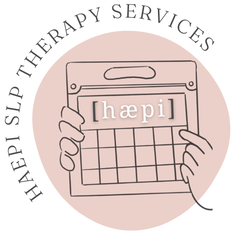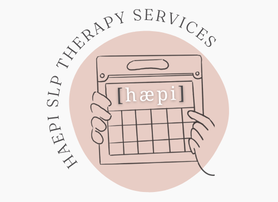|
Qualification criteria is ableist, not evidence-based, and restricts access to the human right of communication for kids who need it the most.
Could you imagine what it would be like to tell a kindergarten-aged child, "looks like you can't hold a pencil, so that means you'll never be able to write. We may as well never let you have a pencil since you clearly can't use it." Do we all agree that's ridiculous? Yet, that's essentially what we are doing when we deny a child access to AAC systems because they aren't matching a picture or selecting an icon independently during the time of the AAC assessment. My hope for the future is that we can eliminate qualification criteria for funded AAC systems, so that we can get AAC into the hands of all children who need it. by Halle Demchuk, SLPPaediatric SLP | GLP-Trained Clinician | Owner of HAEPI SLP
This will likely be a *controversial* post, but I am not trained in (and will not be trained in) using PECS (the Picture Exchange Communication System) for my AAC users for a number of reasons.
PECS focuses heavily (!!!) on requesting, and this can often result in communication only being used as a source of extrinsic motivation (i.e., to get something). It doesn’t take into account all the other reasons to communicate (such as greet, negate, argue, comment, suggest, direct, etc) in order to build intrinsic motivation to communicate. Communication and connecting should be the reward! Teaching PECS often involves hand-over-hand prompting of the child, violating their bodily autonomy. This is not a necessary part of learning picture communication. Modelling for the student on their device with no expectation for the child to copy is an evidence-based way to teach picture/symbol communication, which allows for the child to regain this autonomy and express what they WANT to express. Furthermore, PECS doesn't allow a motor plan to develop as the symbols are always moving, which is an important part of communicating with a symbol-based system. Since PECS focuses on single words to start, it also is not the most appropriate for our gestalt language processors (and up to 85% of Autistic children are GLP!). We don't want our AAC to further contribute to our children being 'stuck' in their single-word or multi-word scripts. And lastly, PECS is not a robust language system that can grow with the child. Our children can learn much more competently if their communication systems are robust from the start, and not being 'upgraded' every few years. We need to presume competence right from the start. NOTE: This is in reference to the Picture Exchange Communication System and not all picture-based communication, such as low tech AAC and core boards. ​While PECS may have a been a gold standard in the past, and many well-meaning therapists have endorsed its use, it's important to listen to our Autistic community who have talked about the negative aspects of the system. Once we know better, we can do better. by Halle Demchuk, SLPPaediatric SLP | GLP-Trained Clinician | Owner of HAEPI SLP |
The HAEPI BlogCheck here for HAEPI updates, helpful SLP information, free resources, articles, and more!
Archives
June 2024
Categories
All
|
Empowering Happy Communicators |
get in touch |
Quick Links |
© HAEPI SLP THERAPY SERVICES.
HAEPI SLP Therapy Services is proudly neurodiverse, Indigenous-owned, and woman-operated.
We acknowledge that the City of Thunder Bay has been built on the traditional territory of Fort William First Nation, signatory to the Robinson Superior Treaty of 1850. We also recognize the contributions made to our community by the Métis people. We strive as guests on these lands to honour our responsibilities to care for this land and uphold the Treaties that were signed therein.



